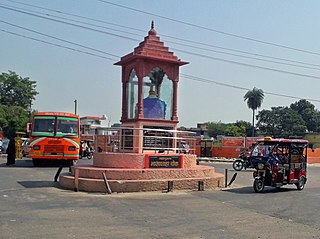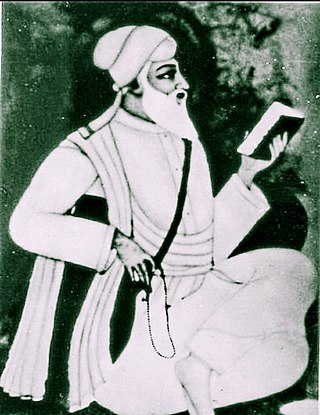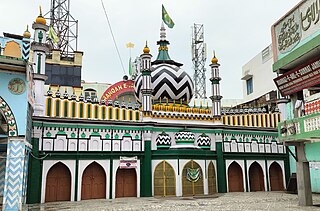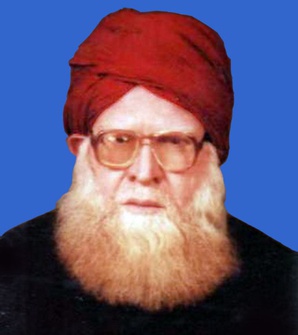
The Chishti order is a Sufi order of Sunni Islam named after the town of Chisht where it was initiated by Abu Ishaq Shami. The order was brought to South Asia by Mu'in al-Din Chishti in the city of Ajmer.

Khawaja Syed Muhammad Nizamuddin Auliya, also known as Hazrat Nizamuddin, Sultan-ul-Mashaikh and Mahbub-e-Ilahi, was an Indian Sunni Muslim scholar, Sufi saint of the Chishti Order, and is one of the most famous Sufis from the Indian Subcontinent. His predecessors were Fariduddin Ganjshakar, Qutbuddin Bakhtiyar Kaki, and Moinuddin Chishti, who were the masters of the Chishti spiritual chain or silsila in the Indian subcontinent.

Islam is the largest and the state religion of the Islamic Republic of Pakistan. Pakistan has over 231.6 Million adherents of Islam. As much as 90% of the population follows Sunni Islam and around 97% of Pakistanis follow Islam. Most Pakistani Sunni Muslims belong to the Hanafi school of jurisprudence, which is represented by the Barelvi and Deobandi traditions.

The Barelvi movement, also known as Ahl al-Sunnah wal-Jama'ah is a Sunni revivalist movement that generally adheres to the Hanafi and Shafi'i schools of jurisprudence, and Maturidi and Ash'ari schools of theology with hundreds of millions of followers, and it encompasses a variety of Sufi orders, including the Chistis, Qadiris, Suhrawardis and Naqshbandis as well as many other orders of Sufism. They consider themselves to be the continuation of Sunni Islamic orthodoxy before the rise of Salafism and the Deobandi movement.

Ahmed Raza Khan Barelvi, known reverentially as A'la Hazrat, was an Indian Islamic scholar and poet who is considered as the founder of the Barelvi movement.

Budaun is a medieval city and headquarters of Budaun district, in the Indian state of Uttar Pradesh. It is located about a mile east of the Sot river, and 27 km north of the Ganges, in the Rohilkhand region of Uttar Pradesh. According to the 2011 census, it has a population of 159,221, which is projected at 161,555 at present. Budaun rose to historical importance as the capital of the Delhi Sultanate for four years from 1210 CE to 1214 CE during the reign of Sultan Iltutmish. It was the most important post of Northern Frontier during Mughal reign. Budaun is a big market, historically famous and religiously important city. Budaun is 230 km south-east of New Delhi and 245 km north-west of Lucknow, both taking about 6 hours by road.

Alauddin Ali Ahmed Sabir (1196–1291) also known as Sabir Kaliyari, , was an Indian Sunni Muslim preacher and Sufi saint in the 13th century. He was nephew and successor to Baba Fareed (1188–1280), and the founder of Sabiriya branch of the Chishti Order. Today, his dargah is located in Piran Kaliyar town, near Haridwar in the Indian state of Uttarakhand. The dargah is one of the most revered shrines for Muslims in India, after Ajmer Sharif in Rajasthan.

Sheikh Noor Ul Mashaikh Sayyid Ahmed Muhiuddin Jeelani NooriShah Arabic:, known more commonly as NooriShah Jeelani, was a renowned 20th-century muslim, sufi, wali, mystic, orator, faqeeh, theologian, mujaddid and highly acclaimed Islamic scholar of the Qadri, Chisti order from the Indian sub continent. He was the 21st grand son of the famous Sufi saint Ghous-e-Azam Sheikh Mohiyudheen Abdul Qadir Jilani of Baghdad. He was also widely known by his title Noor-ul-Mashaikh. He was the Eponymous founder of the Silsila-e-Nooriya tariqa which is a sub-branch of Qadiriyya and Chistiyya in India.

Hashim Peer Dastagir was an Indian Sufi saint belonging to the Qadri Shattari order. His shrine is in Bijapur, Karnataka, India.

Syed Mohammad Ashraf Kichhouchhwi is an Indian Sufi leader and spiritual master from Kichchouchcha Sharif, the famous Sufi shrine of Ashraf Jahangir Semnani in Ambedkar Nagar in Uttar Pradesh. Kichhauchhwi is a patron of various social, academic and other developmental activities of Sufi Sunni Muslims in India. He is the Founder and National President of the All India Ulema and Mashaikh Board (AIUMB), a Sufi movement in India.

Syed Babar Ashraf is an Indian social activist and leader belonging to the Barelvi movement of Sunni Islam. He is the Founder President of Sada-e-Sufia-e-Hind, a representative body of Sufis in India.

Mustafa Raza Khan Qadri (1892–1981), was an Indian Sunni Muslim scholar and author, and leader of the Sunni Barelvi movement following the death of its founder, his father Ahmed Raza Khan. He was known as Mufti-Azam-i-Hind to his followers. He is widely known as Mufti-e-Azam-e-Hind. On his death date his follower celebrate Urs name as Urs-e-Noori on every 14th Muharram of Islamic Year.

Akhtar Raza Khan, also known as Tajush Shari'ah, and Azhari Miyan, was an Indian Islamic scholar. A mufti of the Barelvis, he was the great-grandson of Ahmed Raza Khan Barelvi who was considered to be a Mujaddid by his followers and was the eponymous founder of the Barelvi movement.

Pir Syed Jamaat Ali Shah was a Pakistani author, Islamic scholar and Sufi saint of the Naqshbandi Order. He presided over the All India Sunni Conference and led the Movement for Shaheed Ganj Mosque. He was a contemporary of Ahmed Raza Khan Barelvi, the founder of Barelvi movement.

All India Sunni Conference was an organization of Indian Sunni Muslims associated with Sufism and this Conference became the voice of Barelvi movement in British India. The Conference was established in 1925 in the wake of Congress led secular Indian nationalism, changing Geo-political situation of India by leading Barelvi personalities of that time including Jamaat Ali Shah, Naeem-ud-Deen Muradabadi, Mustafa Raza Khan Qadri, Amjad Ali Aazmi, Abdul Hamid Qadri Badayuni, Mohammad Abdul Ghafoor Hazarvi and Syed Faiz-ul Hassan Shah among others.

Sayed Mohiuddin Hussaini Peerzade, also known as Sayed Tanveer Hashmi, is a Sufi leader and spiritual master from Bijapur Sharif, a Sufi shrine in Karnataka, India. Tanveer Hashmi is a patron of various academic, social, and other activities of Sufi Sunni Muslims in India. He belong to Hussiani Hashmi Family, the family of Ahl al-Bayt. His official name in Shajra Shareef is Syed Mohiuddin Hussaini Hashmi al-Qadri.

Muhammad Waqaruddin Qadri also known as Waqar-e-Millat was an Islamic scholar associated with the Sunni Barelvi movement of south Asia. His fatawa (rulings) are compiled in three volume of the book titled Waqar ul Fatawa. He taught and administered in Islamic institutes in India, Bangladesh and later in Pakistan. He was conferred title of Grand Mufti of Pakistan during Muhammad Zia-ul-Haq regime.

Sardar Ahmad Chishti was a Pakistani Islamic scholar who is recognized by his followers as Muhaddith-e-Azam Pakistan.
All India Tanzeem Ulama-e-Islam (AITUI), also known as Tanzeem Ulama-e-Islam is an organisation of Barelvi Sunni Muslims. In 2019, an article in the Times of India via the Times News Network feed claimed AITUI was the predominant Sunni organization in the country.

Muhammad Ibrahim Raza Khan Qadri Razvi (1907–1965), commonly known as Mufassir-e-Azam-e-Hind and Jilani Miyan, was an Indian Islamic scholar, Sufi mystic, orator, author, and leader of Sunni Muslim’s Barelvi movement of Sunni Islam in the Indian subcontinent. He was the elder brother of Hammad Raza Khan.

















